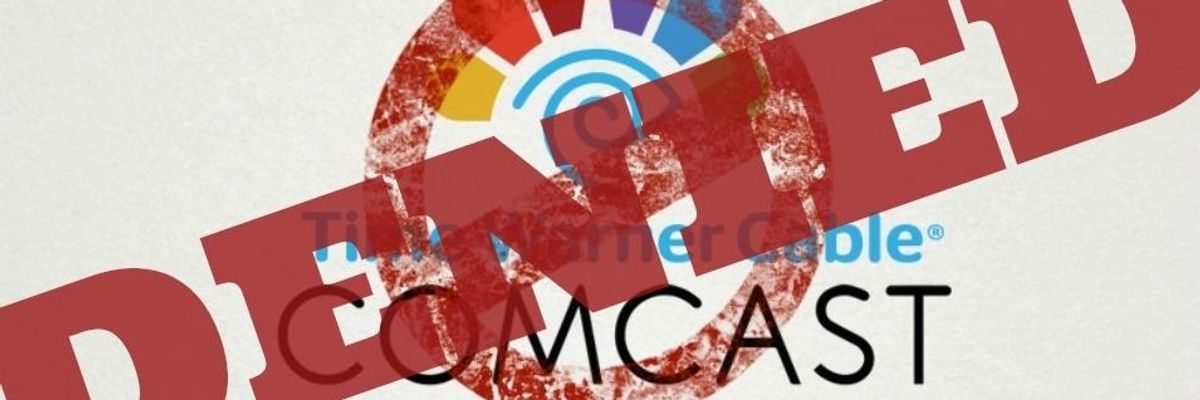Despite a ferocious lobbying effort to get federal approval for a deal since last year, cable giant Comcast is planning to drop its highly-contested bid to merge with its largest competitor Time-Warner, reports Bloomberg news on Thursday.
According to Bloomberg:
Comcast Corp. is planning to walk away from its proposed $45 billion takeover of Time Warner Cable Inc., people with knowledge of the matter said, after regulators planned to oppose the deal.
Comcast is planning to make a final decision on its plans Thursday, and an announcement on the deal's fate may come as soon as Friday, said one of the people, who asked not to be named discussing private information.
This week, U.S. Federal Communications Commission staff joined lawyers at the Justice Department in opposing the planned transaction. FCC officials told the two biggest U.S. cable companies on Wednesday that they are leaning toward concluding the merger doesn't help consumers, a person with knowledge of the matter said.
Opponents of the merger, including consumer advocates and media watchdogs, immediately welcomed the news.
Miles Rapoport, president of Common Cause, championed the efforts of his members who lobbied the FCC and lawmakers to reject the deal. "Citizen voices can still make a difference in our government's decision making," Rapoport stated. "More than 800,000 Americans told the FCC that the Comcast/Time Warner Cable merger would be bad for competition and innovation; their arguments were well-founded and have now carried the day. This is their victory."
Michael Copps, a former FCC commissioner and now a special advisor to Common Cause, said the development was "spectacularly good news for consumers concerned about the spiraling cost of cable and broadband and for millions of citizens who want nothing more to do with gatekeeping and consolidation in the communications ecosystem on which our democracy depends."
Sen. Bernie Sanders (I-Vt.), who stressed his opposition to the deal since it was first announced last year, welcomed what appeared like a defeat for the cable giant.
"The report that Comcast is backing away from its bid to take over Time Warner Cable is good news for American consumers," Sanders said. "The level of media consolidation in America already is unacceptable and it would have been extremely dangerous for one company to control 57 percent of the broadband Internet market, 30 percent of the cable market and dominate 19 of the 20 largest U.S metropolitan areas."
In response to the news, Matt Wood, policy director at the media advocacy group Free Press Policy, issued the following statement:
If the news from the FCC is true, it would mean that Internet users can breathe a sigh of relief. Designating the deal for a hearing would make Comcast and Time Warner Cable go through a lengthy evidentiary procedure. That's a very high hurdle to clear in its own right, and a huge barrier to overcome for a disastrous deal like this one, which has no real public interest benefits to show.
The FCC seems to have heard the nearly one million Americans who have told Washington that the proposed merger helps only the people in the executive suites of Comcast and Time Warner Cable. These executives failed to see the reality that was plain to all of the deal's many opponents. Giving so much control over our communications system to one company -- especially one with a track record of spiraling prices, terrible customer service and blocking Internet content -- would be a terrible mistake.
Americans don't need a bigger Comcast; they need more choices for affordable and open broadband services nationwide. The rejection of this merger would reflect the FCC and the DOJ's renewed commitment to competition and consumer protection. The tens of millions of dollars that Comcast has spent on bankers, lawyers and lobbyists to push this ill-advised merger would have been better spent improving customer service and offering affordable high-speed fiber-to-the-home.
